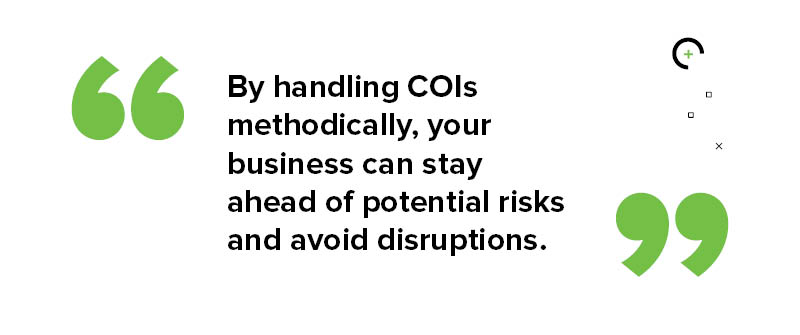
For businesses operating in today’s complex and fast-moving world, managing risks is an essential part of staying successful. Whether you’re dealing with numerous vendors, entering high-stakes contracts, or overseeing diverse projects, ensuring business insurance coverage for everyone involved is a key step in protecting your operations. That’s where the Certificate of Insurance (COI) comes into play.
If you’ve heard of a COI but aren’t entirely sure what it is or why it’s crucial, this guide will break it down for you.
What Is a Certificate of Insurance (COI)?
A Certificate of Insurance (COI) is a standardized document that provides quick proof of insurance coverage for a business or individual. It summarizes the most important information about an insurance policy, including:
- Who is insured: It lists the name of the insured party, whether that’s your business or someone you work with.
- Type of coverage: Details the kind of insurance in place, such as general liability, workers’ compensation, or professional liability.
- Policy limits: Indicates the maximum amount the insurance provider will pay for claims.
- Effective dates: Shows when the coverage begins and ends.
- Insurer’s contact information: Useful for verifying the policy or handling detailed inquiries.
Think of it like a snapshot of a full insurance policy. The COI is concise and easy to share, making it perfect for verifying coverage quickly without poring over lengthy documents. For a deeper understanding, check out this overview of COI.
Why Your Business Needs a COI
For companies managing multiple contracts, hiring contractors, or working across industries, a COI isn’t just a nice-to-have; it’s critical to keeping your business operations secure and uninterrupted. Here’s why:
1. Protecting Against Unexpected Financial Losses
Every business transaction or project comes with some level of risk. Imagine hiring a contractor to upgrade your facility, and during the process, one of their employees gets injured on-site or they accidentally cause property damage. Without a COI on file confirming their insurance, your business could be held financially responsible for these incidents.
Ensuring that anyone you work with has valid necessary insurance coverage prevents hidden liabilities from falling onto your balance sheet. Similarly, being able to provide your own COI quickly reassures clients or partners that your business is financially prepared for potential mishaps. Learn more about why companies request COIs here.

2. Meeting Contractual Insurance Requirements
Contracts often require proof of insurance coverage to finalize agreements. Here are some common examples:
- Vendor Relationships: If you’re hiring a vendor to deliver goods or services, a COI ensures they carry liability insurance to cover accidents or damages linked to their work.
- Leases and Property Use: Landlords or property owners often require tenants to have property and liability insurance in place. A COI verifies compliance with their correct insurance policies.
- Construction Projects: From general contractors to subcontractors, maintaining accurate COIs helps ensure everyone involved in the project carries their share of the risk.
Failing to provide a COI when requested can delay projects, void contracts, or even damage valuable relationships.
3. Building Trust and Credibility
A COI isn’t just a legal safeguard; it’s a sign of professionalism. When you provide a COI, you’re showing clients, partners, or collaborators that you take responsibility seriously. On the other hand, requiring a COI from vendors or contractors before doing business demonstrates that your company prioritizes solid risk management practices.
This transparency and accountability can strengthen your reputation, give your partners confidence, and set the foundation for long-lasting business relationships.
4. Managing Complexity Across Contracts and Vendors
With countless moving parts in most industries, your business may need to balance relationships with multiple vendors, subcontractors, or partners at any given time. Having a COI for each of them is an efficient way to keep insurance typically in compliance.
For example:
- If you’re overseeing a portfolio of properties, you’ll want COIs from tenants, maintenance vendors, and service providers to avoid exposure to risks.
- If your projects involve contractors working across states or internationally, COIs ensure that local laws and liability standards are met at every level.
Maintaining comprehensive COI records simplifies risk management and reduces potential legal or regulatory headaches.
Risks of Operating Without a COI
The absence of a COI, whether for your business or a third party, can lead to significant issues:
- Financial Vulnerability: If an uninsured vendor or partner causes damages, you could be left footing the bill for costly lawsuits, property repairs, or injury claims.
- Operational Delays: Missing COIs can stall or even cancel major projects as contracts may require them before work begins.
- Reputation Damage: Partners or clients could lose trust in your business if you fail to meet their insurance standards or experience uncovered losses.
These risks can hit revenue, derail growth, or leave your company exposed to unnecessary stress.
How to Obtain a COI
Fortunately, getting a Certificate of Insurance is relatively straightforward. Here’s how you can ensure you and your partners are covered:
- Contact Your Insurance Agent – Reach out to your insurer and request a COI. This process is typically quick, with most providers issuing them within a day or two.
- Outline Specific Requirements – Highlight who is requesting the COI, the type of coverage they need, and any special terms. For instance, a client may ask to be listed as a certificate holder on your policy.
- Maintain Effective Documentation – Organize the COIs you provide and request from others to ensure smooth workflows. This documentation can be critical if an issue arises or during audits.
By handling COIs methodically, your business can stay ahead of potential risks and avoid disruptions.

The Bottom Line
For businesses managing multiple contracts, vendors, or large-scale projects, a Certificate of Insurance is more than just a document; it’s a safeguard that enables smooth operations, builds trust, and keeps financial risks in check. Whether you’re providing it to comply with contracts or requesting it to protect your interests, COIs are an indispensable tool for staying competitive and secure.
Stay proactive in managing your risk by incorporating COIs into your business processes. It’s an investment in peace of mind that every company striving for growth and stability should make. Book a Demo today!